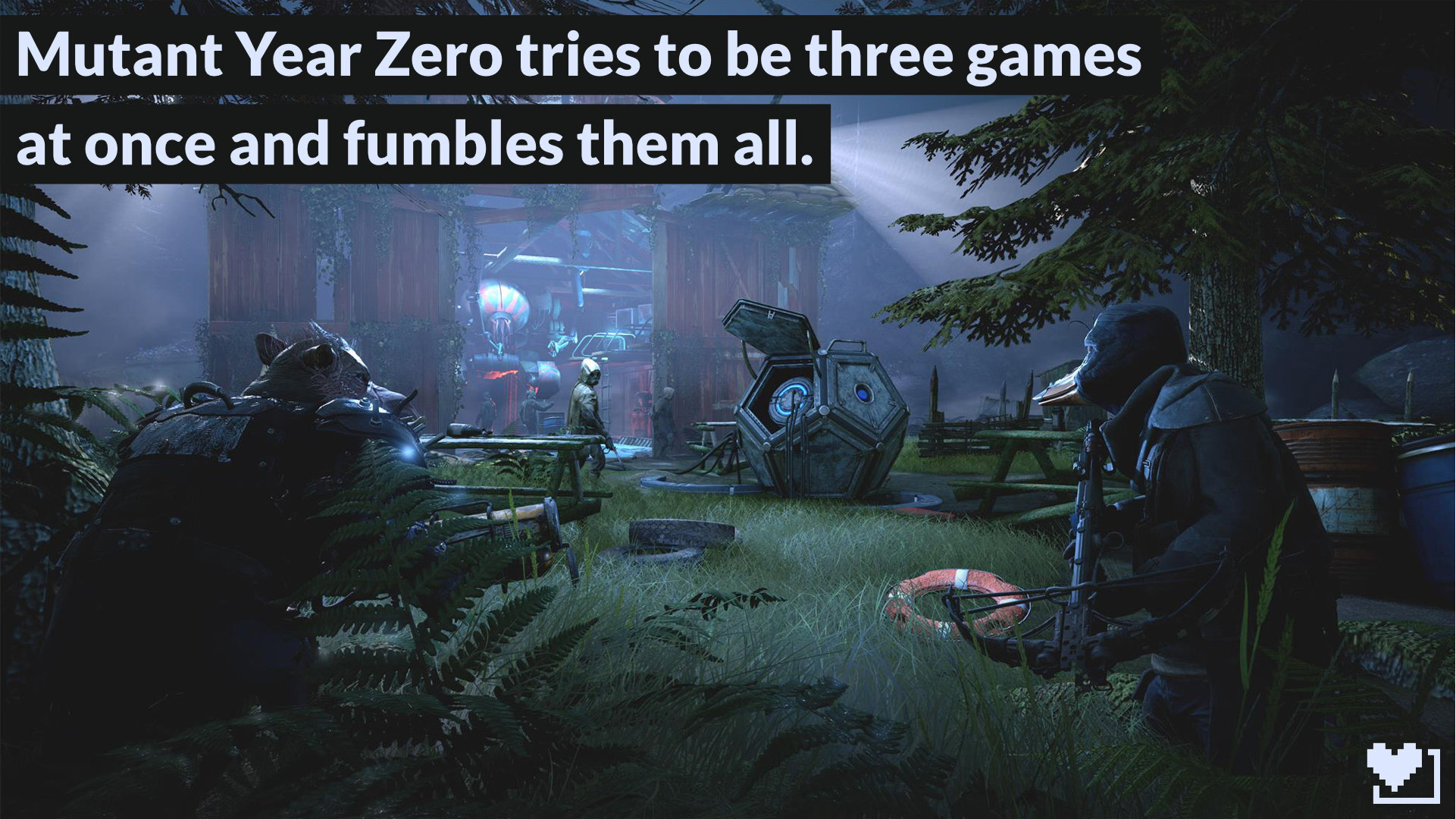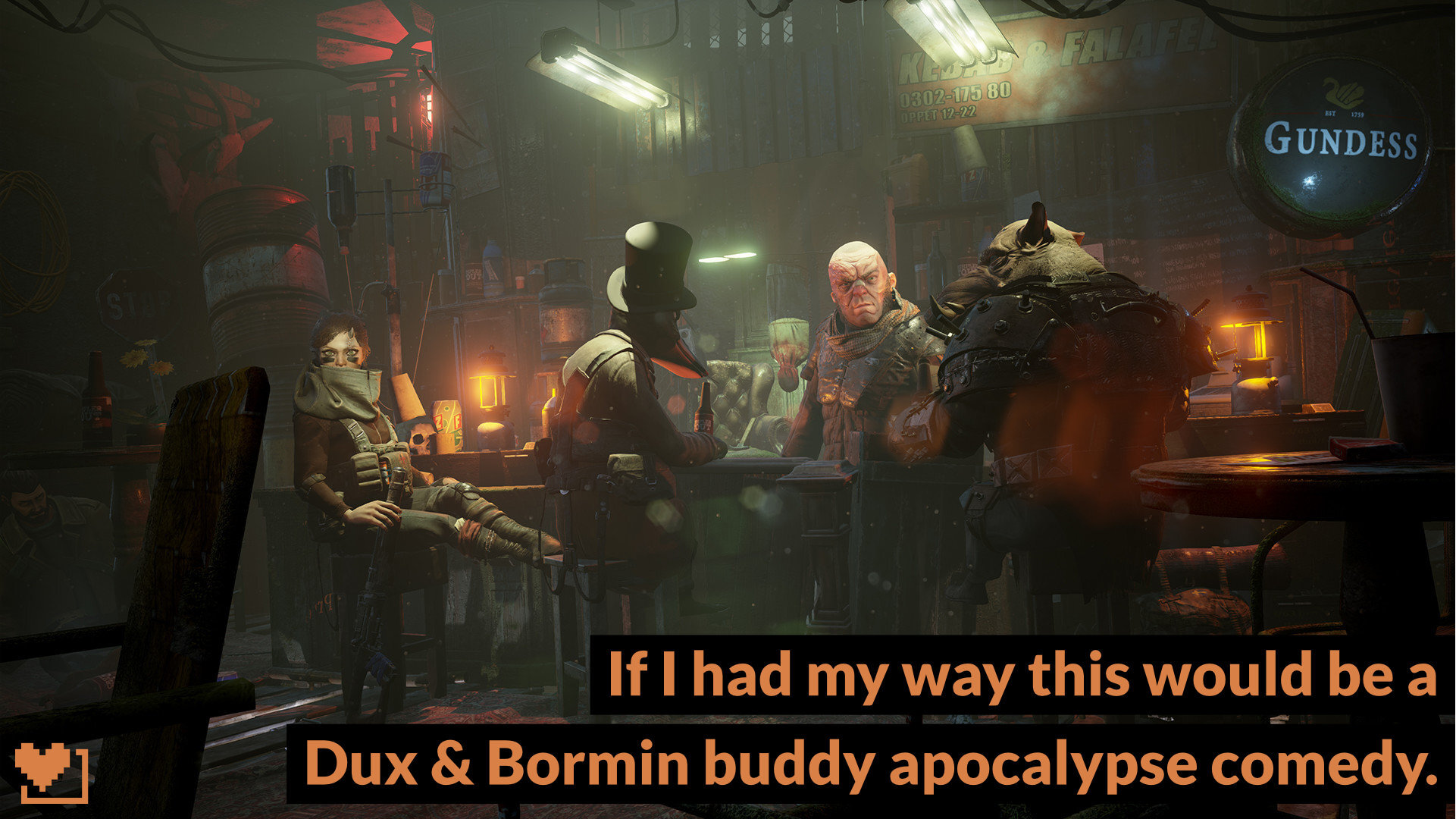Mutant Year Zero: Road to Eden is stretched as thin as its title
Mutant Year Zero: Road to Eden (The Bearded Ladies, 2018) wants to be at least three games in one. It wants to be a tactics game, with a focus on elevation and special abilities; to incorporate real-time stealth, emphasizing enemy spatial awareness and attacking from the shadows; to exist inside a post-apocalyptic world with heavy design influence from the table-top role-playing game Mutant spawned from. I feel exhausted just listing it all. At the same time, however, it is this—ahem—mutant nature of the game which causes it to be so intriguing. Or it would be if everything worked.
What you need to know about Mutant's world is that humanity has destroyed itself, super-power wielding anthropomorphic creatures have immerged from the rubble, and the wildlands are now the domain of a doomsday cult. Dux and Bormin—you can probably guess what animals they are—make up the starting squad and define the game’s sardonic tone even after more characters join up.
If I had my way, Mutant would be a buddy-cop post-apocalypse featuring the dry and focused Bormin, and Dux as the whining voice of the audience. "Why would anyone go to the House of Bones?" A fair question, Dux, but we're doing it anyway. Other characters nestle in easily to genre conventions but lack the spunk of either of the leads. Mutant's world exists in a state of deep nihilism, and its only Dux and Bormin speaking up to say that this is all a bit too serious that holds it back from the brink of grim-dark trash.
As might be expected from its table-top origins, Mutant spends the most time populating the world with flavor-text and forshadowing up events to follow, at its best while elegantly dropping lore within conversations and giving you space to explore. Once the plot begins in earnest the narrative gets a lot sloppier, as if being written on the fly as an excuse for you to visit the four corners of your map. Questions nobody asked are answered with revelations that weren’t setup. Key details are introduced only when necessary and the story concludes so oddly I'm not sure if it's a cliffhanger or just poor writing.
Screenshot courtesy of The Bearded Ladies
In a pattern seen throughout the game, Mutant's stealth similarly builds on a strong foundation but fails to go anywhere interesting. Though Mutant offers you a very limited move set while sneaking around, it's enough at first to provide an interesting layer over the tactics combat by allowing you freedom in how you engage with enemies.
Furthermore, it is often imperative to use stealth to take out isolated enemies, as early on fights with even one more enemy than your squad almost always end in your death. As the game progresses and encounters become more complex, the stealth mechanics fail to keep pace. Not being able to vault through windows or otherwise utilize the same degree of movement as when in combat feels like an odd oversight, as is the inability to move while in cover.
Most bizarre, though, is how inexplicable each encounter can be in terms of whether other enemies on the map can hear you. Late in the game, I engaged a massive robot while in stealth and managed to destroy it using silenced weapons before it could fire back. This resulted in the robot exploding violently enough to destroy my cover yet failed to alert any of the enemies loitering only a few yards away.
It seems Mutant has a highly selective radius for enemy alerts, and often I felt as if I was actively working within these gaps rather than engaging with the game on its own terms.
Mutant's tactics combat system is the most developed part of the stealth-combat-exposition loop, being mechanically "complete" if less than inspired. The basic structure of encounters follows XCOM: Enemy Unknown's (Fireaxis, 2012) tactics blueprint of two moves per character, promoting a more offensive playstyle while being noticeably less refined on a moment-to-moment basis. Mutant's twist comes by way of its mutant powers, which on paper are the distinguishing factor between each faction but in practice have close parity along enemy lines.
It's disappointing as throwing superpowers over XCOM's framework could have been enough to give Mutant its personality, but the powers are so muted (and possessed by enemy and player alike) that it's easy to forget they're there.
Screenshot courtesy of The Bearded Ladies
As I worked my way down each character's skill tree, I was repeatedly disappointed by what I was unlocking, knowing I'd never use it or learning it was only a minor skill buff. For something so integral to Mutant's identity, for its abilities to be so underwhelming is another bizarre oversight that holds the game back from ever being more than so-so.
I like so much of what Mutant is attempting to do. Dux and Bormin are delightful, adding stealth gameplay onto a tactics game is clever and works well before becoming played out, and there are so few tactics games to speak of that even one which is otherwise derivative provided a welcome excursion for a few hours. It's so frustrating that everything begins to fall apart right as the game comes into its own. By trying so many things at once Mutant succeeds as a proof of concept even as it demonstrates how difficult it is to make
Editor's Note: This was written back when the game released, before the great tactics deluge. It's being published now due to the release of Corruption 2029 as a point of comparison. Apologies for the midling quality of this piece, I've learned a lot since writing it.


